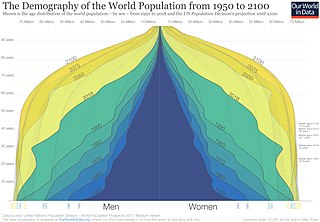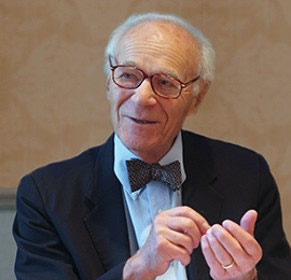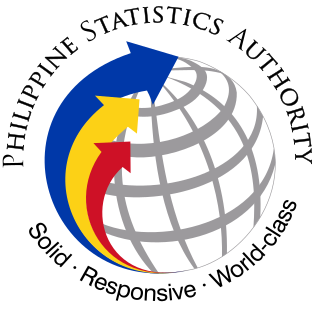
A census is the procedure of systematically acquiring, recording and calculating population information about the members of a given population. This term is used mostly in connection with national population and housing censuses; other common censuses include censuses of agriculture, traditional culture, business, supplies, and traffic censuses. The United Nations (UN) defines the essential features of population and housing censuses as "individual enumeration, universality within a defined territory, simultaneity and defined periodicity", and recommends that population censuses be taken at least every ten years. UN recommendations also cover census topics to be collected, official definitions, classifications and other useful information to co-ordinate international practices.

Demography is the statistical study of populations, especially human beings.
An economist is a professional and practitioner in the social science discipline of economics.
Statistics Canada, formed in 1971, is the agency of the Government of Canada commissioned with producing statistics to help better understand Canada, its population, resources, economy, society, and culture. It is headquartered in Ottawa.

Lawrence Robert Klein was an American economist. For his work in creating computer models to forecast economic trends in the field of econometrics in the Department of Economics at the University of Pennsylvania, he was awarded the Nobel Memorial Prize in Economic Sciences in 1980 specifically "for the creation of econometric models and their application to the analysis of economic fluctuations and economic policies." Due to his efforts, such models have become widespread among economists. Harvard University professor Martin Feldstein told the Wall Street Journal that Klein "was the first to create the statistical models that embodied Keynesian economics," tools still used by the Federal Reserve Bank and other central banks.

Simon Smith Kuznets was an American economist and statistician who received the 1971 Nobel Memorial Prize in Economic Sciences "for his empirically founded interpretation of economic growth which has led to new and deepened insight into the economic and social structure and process of development."

Sir John Richard Nicholas Stone was an eminent British economist. He was educated at Gonville and Caius College and King's College at the University of Cambridge. In 1984, he was awarded the Nobel Memorial Prize in Economic Sciences for developing an accounting model that could be used to track economic activities on a national and, later, an international scale.
Economic forecasting is the process of making predictions about the economy. Forecasts can be carried out at a high level of aggregation—for example for GDP, inflation, unemployment or the fiscal deficit—or at a more disaggregated level, for specific sectors of the economy or even specific firms. Economic forecasting is a measure to find out the future prosperity of a pattern of investment and is the key activity in economic analysis. Many institutions engage in economic forecasting: national governments, banks and central banks, consultants and private sector entities such as think-tanks, companies and international organizations such as the International Monetary Fund, World Bank and the OECD. A broad range of forecasts are collected and compiled by "Consensus Economics". Some forecasts are produced annually, but many are updated more frequently.
Articles in economics journals are usually classified according to JEL classification codes, which derive from the Journal of Economic Literature. The JEL is published quarterly by the American Economic Association (AEA) and contains survey articles and information on recently published books and dissertations. The AEA maintains EconLit, a searchable data base of citations for articles, books, reviews, dissertations, and working papers classified by JEL codes for the years from 1969. A recent addition to EconLit is indexing of economics journal articles from 1886 to 1968 parallel to the print series Index of Economic Articles.

The Philippine Statistics Authority is the central statistical authority of the Philippine government that collects, compiles, analyzes and publishes statistical information on economic, social, demographic, political affairs and general affairs of the people of the Philippines and enforces the civil registration functions in the country.

The Pakistan Institute of Development Economics is a post-graduate research institute and a public policy think tank located in the vicinity of Islamabad, Pakistan.

The German Institute for Economic Research, or, more commonly DIW Berlin, is a economic research institute in Germany, involved in basic research and policy advice. It is a non-profit academic institution, financed with public grants from the Berlin Senate Department for Economics, Technology and Research and the Federal Department for Economics and Technology. DIW Berlin was founded in 1925 as the Institute for Business Cycle Research and was later renamed.

Aggregate data is high-level data which is acquired by combining individual-level data. For instance, the output of an industry is an aggregate of the firms’ individual outputs within that industry. Aggregate data are applied in statistics, data warehouses, and in economics.
The Ministry of Statistics and Programme Implementation (MoSPI) is a ministry of Government of India concerned with coverage and quality aspects of statistics released. The surveys conducted by the Ministry are based on scientific sampling methods.
Robert Morris Townsend is an American economist and professor; he is the Elizabeth & James Killian Professor of Economics at Massachusetts Institute of Technology. Prior to joining MIT, he was the Charles E. Merriam Distinguished Service Professor in the Department of Economics at the University of Chicago where he remained a research associate (professor) until 2018.

The National Institute of Statistics and Applied Economics (INSEA) is one of the oldest engineering schools in Morocco and remains to this day one of the most prestigious Moroccan Grandes écoles in engineering. Located in Rabat and created in 1961, its latest naming has changed by Royal Decree from the appellation The Training Centre of Engineers in Statistics in 1967 with the support of the Economic Commission for Africa (ECA).
Karol Józef Krótki, FRSC was a renowned Polish Canadian demographer who, at various times, lived and worked in Poland, the United Kingdom, Sudan, Pakistan, Morocco and Canada. Professor Krotki was elected to the Royal Society of Canada in 1979.
The National Statistical Office of Malawi (NSO) is the main government department responsible for the collection and dissemination of official statistics in Malawi. It has headquarters in Zomba and 300 employees, and operates under the 2013 Statistics Act. The NSO also has regional offices in the major urban centres of Lilongwe, Mzuzu, and Blantyre.
Datuk Ramesh Chander is a development economist, a former Chief Statistician of Malaysia, and former Statistical Adviser at the World Bank.

Agustín Maravall Herrero is a Spanish economist. He is known for his contributions to the analysis of statistics and econometrics, particularly in seasonal adjustment and the estimation of signals in economic time series. He created a methodology and several computer programs for such analysis that are used throughout the world by analysts, researchers, and data producers. Maravall retired in December 2014 from the Bank of Spain.











